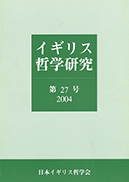Volume 27
Displaying 1-10 of 10 articles from this issue
- |<
- <
- 1
- >
- >|
-
2004 Volume 27 Pages 5-20
Published: March 20, 2004
Released on J-STAGE: April 25, 2018
Download PDF (1631K)
-
2004 Volume 27 Pages 21-37
Published: March 20, 2004
Released on J-STAGE: April 25, 2018
Download PDF (1587K) -
2004 Volume 27 Pages 39-54
Published: March 20, 2004
Released on J-STAGE: April 25, 2018
Download PDF (1688K) -
2004 Volume 27 Pages 55-69
Published: March 20, 2004
Released on J-STAGE: April 25, 2018
Download PDF (1547K)
-
2004 Volume 27 Pages 70-73
Published: March 20, 2004
Released on J-STAGE: April 25, 2018
Download PDF (486K) -
2004 Volume 27 Pages 74-78
Published: March 20, 2004
Released on J-STAGE: April 25, 2018
Download PDF (576K)
-
2004 Volume 27 Pages 79-101
Published: March 20, 2004
Released on J-STAGE: April 25, 2018
Download PDF (1371K)
-
2004 Volume 27 Pages 102-112
Published: March 20, 2004
Released on J-STAGE: April 25, 2018
Download PDF (1158K)
-
2004 Volume 27 Pages 115-122
Published: March 20, 2004
Released on J-STAGE: April 25, 2018
Download PDF (910K)
-
2004 Volume 27 Pages 124
Published: March 20, 2004
Released on J-STAGE: April 25, 2018
Download PDF (280K)
- |<
- <
- 1
- >
- >|
